A+ revision material
A+ Revision Material refers to educational content and resources designed to help students prepare for and excel in their academic assessments, particularly A+ graded exams or courses. These materials typically include study guides, practice exams, flashcards, and other resources that condense and simplify complex subject matter to aid in effective revision. They are created to enhance a student's understanding of the material, reinforce key concepts, and improve their chances of achieving top grades. A+ Revision Material is commonly used by students at various levels of education, from high school to college and beyond, to boost their knowledge and confidence before important examinations.
- 977
- 0
- 57
Community
- Followers
- Following
6 Reviews received
1034 items
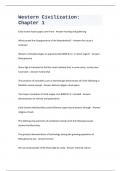
Western Civilization: Chapter 1 study Guide 2024
Early human food supply came from - Answer-hunting and gathering What caused the disappearance of the Neanderthals? - Answer-the cause is unknown Western civilization began in approximately 8000 B.C.E. in which region? - Answer-. Mesopotamia Stone Age art devoted to fertility rituals indicate that, in some cases, society may have been - Answer-matriarchal The presence of monoliths such as Stonehenge demonstrate all of the following in Neolithic society except - Answer-defined religion rit...
- Package deal
- Exam (elaborations)
- • 4 pages •
Early human food supply came from - Answer-hunting and gathering What caused the disappearance of the Neanderthals? - Answer-the cause is unknown Western civilization began in approximately 8000 B.C.E. in which region? - Answer-. Mesopotamia Stone Age art devoted to fertility rituals indicate that, in some cases, society may have been - Answer-matriarchal The presence of monoliths such as Stonehenge demonstrate all of the following in Neolithic society except - Answer-defined religion rit...
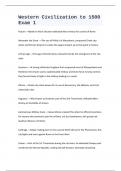
Western Civilization to 1500 Exam 1 with Correct Answers 2024
Actium -->Battle in which Octavian defeated Marc Antony for control of Rome Alexander the Great -->The son of Philip II of Macedonia; conquered Greek city- states and Persian Empire to create the largest empire up to that point in history Archaic Age -->The age of Greek history characterized by the emergence of the city- state Assyrians -->A strong militaristic kingdom that conquered most of Mesopotamia and Palestine; the empire used a sophisticated military and brute force to ke...
- Exam (elaborations)
- • 9 pages •
Actium -->Battle in which Octavian defeated Marc Antony for control of Rome Alexander the Great -->The son of Philip II of Macedonia; conquered Greek city- states and Persian Empire to create the largest empire up to that point in history Archaic Age -->The age of Greek history characterized by the emergence of the city- state Assyrians -->A strong militaristic kingdom that conquered most of Mesopotamia and Palestine; the empire used a sophisticated military and brute force to ke...
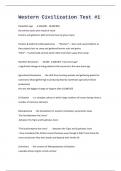
Western Civilization Test #1
Paleolithic Age - 2,500,000 - 10,000 BCE the earliest tools were made of stone hunters and gatherers (did not know how to grow crops) Hunters & Gatherers (Mesopotamia) - *Women* -> bore and raised children so they stayed close to camp and gathered berries nuts and grains *Men* -> hunted wild animals which often took them away from camp Neolithic Revolution - 10,000 - 4,000 BCE "new stone age" a significant change in living patterns that occurred in the new stone age Agricultural Re...
- Package deal
- Exam (elaborations)
- • 7 pages •
Paleolithic Age - 2,500,000 - 10,000 BCE the earliest tools were made of stone hunters and gatherers (did not know how to grow crops) Hunters & Gatherers (Mesopotamia) - *Women* -> bore and raised children so they stayed close to camp and gathered berries nuts and grains *Men* -> hunted wild animals which often took them away from camp Neolithic Revolution - 10,000 - 4,000 BCE "new stone age" a significant change in living patterns that occurred in the new stone age Agricultural Re...
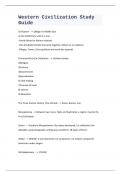
Western Civilization Study Guide 2024
Civilization --> 1)Began in Middle East 2) Has FOUR Parts until it is one: -Family {blood or distinct relation} -Clan {multiple families that work together, distant or no relation} -Villages, Towns, Cities {political and social ties expand} Characteristics of a Civilization --> 1)Urban Society 2)Religion 3)Literacy 4)Government 5)Specialization 6) Tool-making 7)Concept of time! 8) Leisure 9) Education The Three Ancient History Time Periods --> Stone, Bronze, Iron. Mesopotam...
- Package deal
- Exam (elaborations)
- • 5 pages •
Civilization --> 1)Began in Middle East 2) Has FOUR Parts until it is one: -Family {blood or distinct relation} -Clan {multiple families that work together, distant or no relation} -Villages, Towns, Cities {political and social ties expand} Characteristics of a Civilization --> 1)Urban Society 2)Religion 3)Literacy 4)Government 5)Specialization 6) Tool-making 7)Concept of time! 8) Leisure 9) Education The Three Ancient History Time Periods --> Stone, Bronze, Iron. Mesopotam...
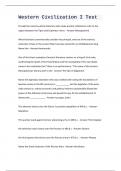
Western Civilization I Test for 2024
Provide the name by which historians who study ancient civilizations refer to the region between the Tigris and Euphrates rivers: - Answer-Mesopotamia What historians conventionally consider the principal, and one of the earliest, collection of laws in the ancient Near East was named for an old Babylonian King. Name him - Answer-Hammurabi One of the finest examples of ancient literature centers on a king of Uruk who, confronting the death of his friend Enkidu and the inevitability of his own ...
- Package deal
- Exam (elaborations)
- • 10 pages •
Provide the name by which historians who study ancient civilizations refer to the region between the Tigris and Euphrates rivers: - Answer-Mesopotamia What historians conventionally consider the principal, and one of the earliest, collection of laws in the ancient Near East was named for an old Babylonian King. Name him - Answer-Hammurabi One of the finest examples of ancient literature centers on a king of Uruk who, confronting the death of his friend Enkidu and the inevitability of his own ...
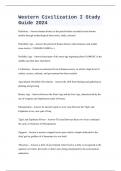
Western Civilization I Study Guide 2024
Prehistory - Answer-human history in the period before recorded events known mainly through archaeological discoveries, study, research Paleolithic Age - Answer-the period of human history when humans used simple stone tools (c. 2,500,000-10,000 b.c.) Neolithic Age - Answer-latest part of the stone-age beginning about 10,000 BC in the middle-east (but later elsewhere) Civilization - Answer-an advanced level of human society, in which a high level of culture, science, industry, and governm...
- Package deal
- Exam (elaborations)
- • 9 pages •
Prehistory - Answer-human history in the period before recorded events known mainly through archaeological discoveries, study, research Paleolithic Age - Answer-the period of human history when humans used simple stone tools (c. 2,500,000-10,000 b.c.) Neolithic Age - Answer-latest part of the stone-age beginning about 10,000 BC in the middle-east (but later elsewhere) Civilization - Answer-an advanced level of human society, in which a high level of culture, science, industry, and governm...
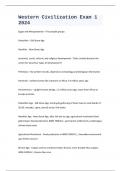
CLEP Western Civilization 2024 study Guide
Egypt and Mesopotamian - First people groups Paleolithic - Old Stone Age Neolithic - New Stone Age economic, social, cultural, and religious development - Cities created became the center for what four types of development? Prehistory - No written records, depend on archaeology and biological information Hominids - earliest human-like creatures in Africa 3-4 million years ago Homoerectus - upright human beings, 1.5 million years ago, move from Africa to Europe and Asia Paleolithic Age -...
- Package deal
- Exam (elaborations)
- • 7 pages •
Egypt and Mesopotamian - First people groups Paleolithic - Old Stone Age Neolithic - New Stone Age economic, social, cultural, and religious development - Cities created became the center for what four types of development? Prehistory - No written records, depend on archaeology and biological information Hominids - earliest human-like creatures in Africa 3-4 million years ago Homoerectus - upright human beings, 1.5 million years ago, move from Africa to Europe and Asia Paleolithic Age -...
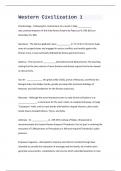
CLEP Western Civilization 1 2024
Charlemange - Following his containment of a revolt in Italy, ___________ was,crowned emporer of the Holy Roman Empire by Pope Leo III (795-816) on December 25, 800. Spartacus - The famous gladiator-slave ___________ in 73-71 B.C.E formed a huge army of escaped slaves and engaged in various conflicts and revolts against the Roman army, it was eventually defeated by Roman general Crassus. Ephesus - The Council of ___________(431) denounced Nestorianism, the teaching stating that the two natur...
- Package deal
- Exam (elaborations)
- • 16 pages •
Charlemange - Following his containment of a revolt in Italy, ___________ was,crowned emporer of the Holy Roman Empire by Pope Leo III (795-816) on December 25, 800. Spartacus - The famous gladiator-slave ___________ in 73-71 B.C.E formed a huge army of escaped slaves and engaged in various conflicts and revolts against the Roman army, it was eventually defeated by Roman general Crassus. Ephesus - The Council of ___________(431) denounced Nestorianism, the teaching stating that the two natur...
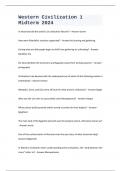
CLEP Western Civilization 1 2024
In what land did the world's 1st civilization flourish? - Answer-Sumer How were Paleolithic societies supported? - Answer-by hunting and gathering During what era did people begin to shift from gathering to cultivating? - Answer- Neolithic Era On what did both the Sumerians and Egyptians base their writing systems? - Answer- pictographs Civilization truly dawned with the widespread use of which of the following metals in toolmaking? - Answer-bronze Memphis, Cairo, and Giza were all found ...
- Package deal
- Exam (elaborations)
- • 11 pages •
In what land did the world's 1st civilization flourish? - Answer-Sumer How were Paleolithic societies supported? - Answer-by hunting and gathering During what era did people begin to shift from gathering to cultivating? - Answer- Neolithic Era On what did both the Sumerians and Egyptians base their writing systems? - Answer- pictographs Civilization truly dawned with the widespread use of which of the following metals in toolmaking? - Answer-bronze Memphis, Cairo, and Giza were all found ...
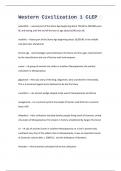
Western Civilization 1 CLEP 2024
paleolithic -->second part of the Stone Age beginning about 750,00 to 500,000 years BC and lasting until the end of the last ice age about 8,500 years BC neolithic -->latest part of the Stone Age beginning about 10,000 BC in the middle east (but later elsewhere) bronze age -->(archeology) a period between the Stone and Iron ages, characterized by the manufacture and use of bronze tools and weapons sumer -->A group of ancient city-states in southern Mesopotamia; the earliest ci...
- Package deal
- Exam (elaborations)
- • 12 pages •
paleolithic -->second part of the Stone Age beginning about 750,00 to 500,000 years BC and lasting until the end of the last ice age about 8,500 years BC neolithic -->latest part of the Stone Age beginning about 10,000 BC in the middle east (but later elsewhere) bronze age -->(archeology) a period between the Stone and Iron ages, characterized by the manufacture and use of bronze tools and weapons sumer -->A group of ancient city-states in southern Mesopotamia; the earliest ci...

Association of Social Work Boards. ASWB Bachelors Exam with correct Answers 2024
Association of Social Work Boards. ASWB Masters Practice Test 2024 Edition with All Questions and Answers
Test Bank ( Pharmacology) 11th Edition by Linda E. McCuistion Chapter 1-58
Microbiology Lab Report Assignment 2024
Great work
NCLEX Exam QUESTIONS with Correct Answers for November/ December 2023